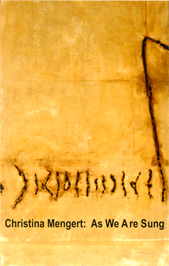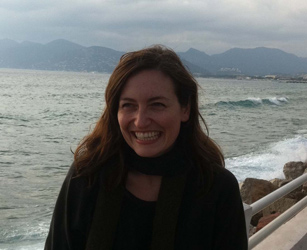
As We Are Sung (Burning Deck Press, 2011).

As We Are Sung (Burning Deck Press, 2011).
First Book Questionnaire: Christina Mengert
1. Does your manuscript bear any relation to a graduate thesis/dissertation project?
No. In fact, I began writing it the day I finished my PhD dissertation. It was the first time in eight years I’d written a poem that would not be seen by a workshop. Looking back on it now, I think that mattered. I could and would still show the poems to the writers who had guided me through graduate school, but writing outside of the academic institution proper was strangely (or not strangely!) creatively liberating.
2. How do you feel about these poems now that they’ve materialized in book format?
Depends on the poem, really. I finished the manuscript over four years ago now, so there is this part of me that has forgotten the thoughts that birthed it. So maybe it’s like finding an old photograph of yourself and thinking, huh, that’s what I looked like then. Maybe you cringe at your haircut, etc., but appreciate the smoother quality of your skin.
3. What was your experience when you began publishing? What challenges did you encounter?
When I began publishing individual poems, the great challenge was enduring the litany of rejections. I remember opening a letter from a press that just had the words NO scribbled in marker on the page. That was a tough day.
One rather funny thing I did while I was still in undergrad was email an editor, adopting a more collegial tone, something like, “oh, I’ve been meaning to send you poems for ages, etc.” and attaching a series of poems I’d written. He published them, remarkably, though I’m sure he was hip to my ruse. That was my first publication. After that, it became easier. Also, I’m fairly certain the poems got a little better too, which helps a lot.
4. How, if at all, did chapbooks prepare you for the making of a full-length collection?
Never did the chapbook thing. I’m a fan of others’, but I never published one.
5. How did you shape and order your manuscript?
Globally, the manuscript is ordered in three parts: Part A, Bridge, and Part B. I was thinking, in the parts, a bit about formal music composition – exposition, development, and recapitulation (as the manuscript itself deals with music, sound, singing). The bridge is not so much development as a hiatus more deeply into language itself (each poem somehow working to poetically define a word or idea), the sounds that make up our attempts at meaning. But I liked thinking of the book as a score, in a way, that moves through themes, tones, timbres, etc.
In terms of specific ordering of poems, that was a largely intuitive process, which I liken to the making of a mix tape.
6. Was anyone or anything indispensable in the process of making your debut collection?
So many things and people. A book is a culmination of so much, I think – so much thought, music, pieces of language that you bring to your work, so much of others’ style that we absorb and imitate and attempt to rework – this of itself includes literally centuries of other people’s work that we take in and hopefully make something meaningful from. Without which there would be no book.
And then there are those things of a different order: the sometimes daily conversations I had with incredibly smart and gifted writers, the support and energy of Keith and Rosmarie Waldrop, who published the book.
7. What is your impression of book contests?
I think book publishing contests can be a good way for writers to first get published, but it is also an expensive way for writers to first get published. In truth, I think it can be a fruitful process if you know the press, know the work of the judge, and know your own work, who it may appeal to, and don’t simply submit to any press hosting a contest.
I have very few opinions about contests that judge the value of a book that has already been published. It is a nice way to support creative work, though it certainly is not the final word on the value of a book.
8. How did you learn to navigate the press world?
I acted as a reader for Verse Magazine and the Denver Quarterly, which gave me some insight into the literary magazine world. I also listened a lot to people who actually published books, storing away their advice and experience like a camel journeying through the desert.
9. What aspirations did you have for this book?
Only that some people might read it.
10. How would you describe this work?
I have no idea. My friend J’Lyn tells me that they are lyrical, and describes them as Sprechstimme (a word I use in the book, German for “speechsong”), poised somewhere between speaking and singing. And indeed, one of my abiding interests is that place between speech and song, the desire to take the instrument of speech and make it beautiful.
11. Do you work primarily on discrete poems, serially, toward a project, with a set of concerns, or otherwise?
When I’m not officially working on a manuscript, I experiment a lot with style, content, etc., until I find something that has real momentum within me. Once that happens, that feeling of being a little pregnant, I find myself typically keeping to certain themes or ideas, usually employing a couple of different styles as I poetically work through those ideas until I have a manuscript. I rarely think of it as a project, per se, just as ideas that keep me interested enough to write a lot of poems.
12. Whose poems affect you or your work?
Oh, Lord. So many. Sappho, Rilke, Petrarch, Elizabeth Bishop, Rae Armantrout, Frank O’Hara, Marianne Moore, Shakespeare, John Donne, Emily Dickinson, Shelley, Barbara Guest, Bin Ramke, Keats, T.S. Eliot, Psalms, John Ashbery, Keith Waldrop, Hopkins, Whitman, to name a very few.
13. What are you working on now?
Mostly I am writing screenplays for an independent production company based in New York. I have a manuscript I’m just somewhat circulating, and when I write poems, they are often short lyrics I’m calling meditations. They may or may not accumulate into a body of work. We shall see.
 Christina Mengert is the author of As We Are Sung (Burning Deck, 2011), and co-editor of 12x12: Conversations in 21st Century Poetry and Poetics (University of Iowa Press, 2009). She currently lives in upstate New York, where she writes poems and screenplays and advises for Bard College’s Prison Initiative Program.
Christina Mengert is the author of As We Are Sung (Burning Deck, 2011), and co-editor of 12x12: Conversations in 21st Century Poetry and Poetics (University of Iowa Press, 2009). She currently lives in upstate New York, where she writes poems and screenplays and advises for Bard College’s Prison Initiative Program.